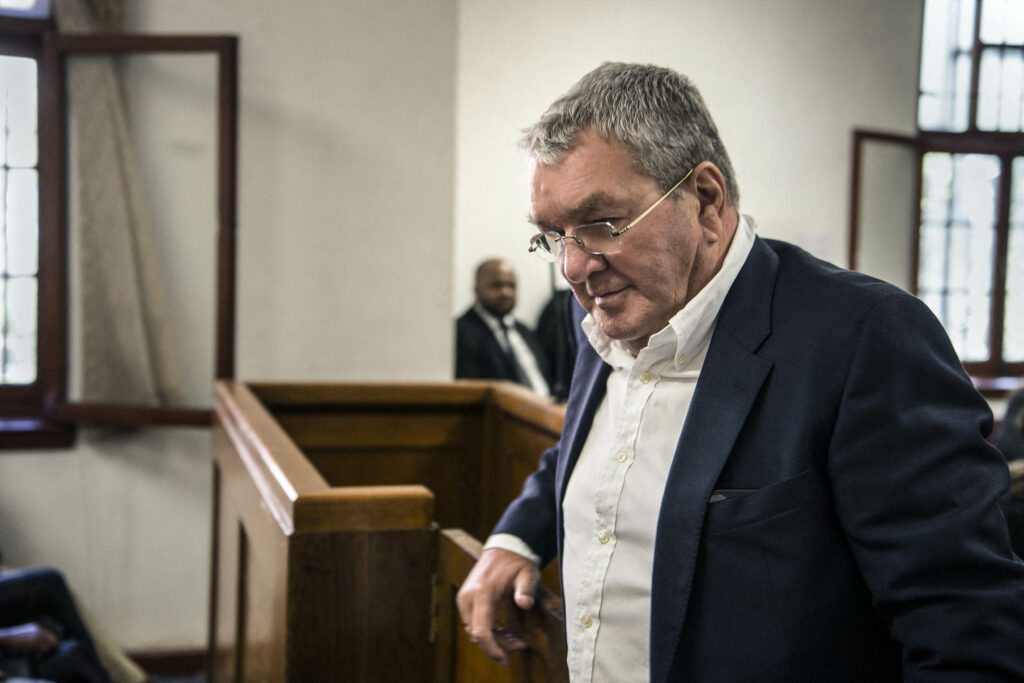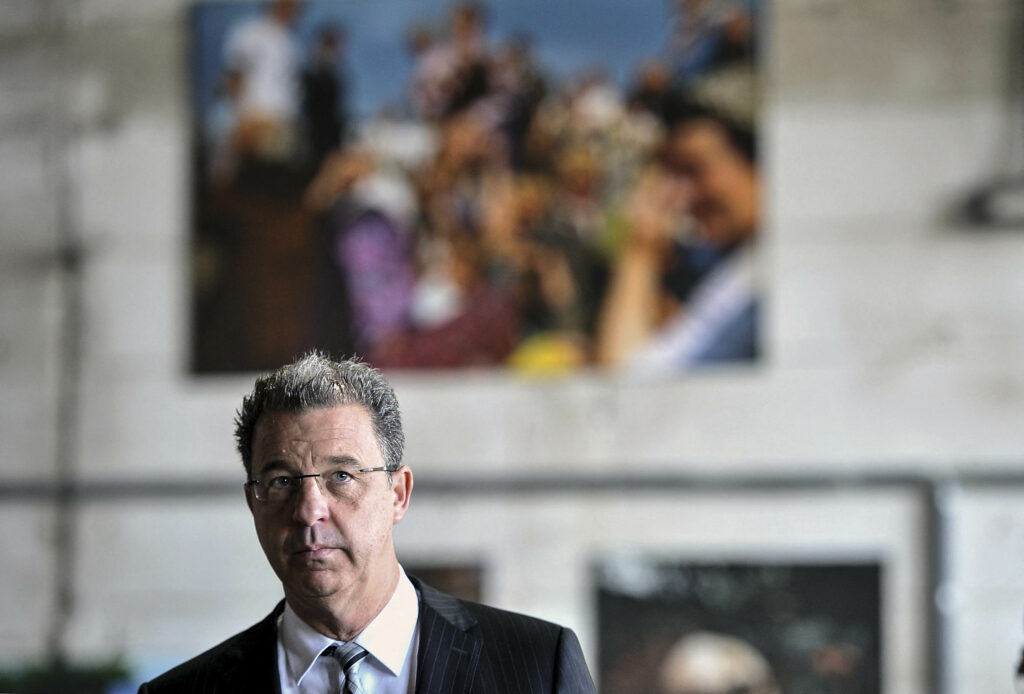A woman looks at the wall of the names of people killed in the Rwanda genocide. Photo: Yasuyoshi Chiba/AFP/Getty Images
In November last year, chief prosecutor Serge Brammertz of the International Residual Mechanism for Criminal Tribunals (IRMCT) took a trip to South Africa to meet President Cyril Ramaphosa’s cabinet in an effort to remind Pretoria of its commitment to help find and prosecute those implicated and charged with war crimes and human rights violations.
Brammertz, who heads the structure mandated by the UN security council to find human rights violators in Rwanda and former Yugoslavia, has long expressed frustration with South Africa.
The South African government failed to arrest Fulgence Kayishema, indicted for genocide and other serious crimes in Rwanda.
“Kayishema is not the only one of our fugitives linked to South Africa, and it is likely that others who may have committed genocide are currently in South Africa,” Brammertz tells the Mail & Guardian.
Kayumba Nyamwasa, for instance, a former general of the Rwandan Patriotic Army, was granted refugee status in South Africa. In 2012, Spain requested his extradition which would be later renewed by Brammertz in 2021. Nyamwasa remains at large.
In December 2017, the Netherlands requested the extradition of Augustinus Maria Kouwenhoven, a Dutch arms trafficker convicted and sentenced to 19 years’ imprisonment for complicity in war crimes under the regime of former Liberian president Charles Taylor.
 Guus Van Kouwenhoven, a convicted Dutch arms dealer, walks out of the dock in the Magistrate’s Court, prior his extradition hearing on February 27, 2018, in Cape Town. – Kouwenhoven, sentenced to 19 years in prison in his country for selling weapons to former Liberian President, Charles Taylor, was arrested in December 2017 in South Africa. (RODGER BOSCH / AFP)
Guus Van Kouwenhoven, a convicted Dutch arms dealer, walks out of the dock in the Magistrate’s Court, prior his extradition hearing on February 27, 2018, in Cape Town. – Kouwenhoven, sentenced to 19 years in prison in his country for selling weapons to former Liberian President, Charles Taylor, was arrested in December 2017 in South Africa. (RODGER BOSCH / AFP)
Kouwenhoven was granted a visa to reside in South Africa, which was later cancelled in November 2020. In 2021, the supreme court of appeal dismissed Kouwenhoven’s appeal related to the extradition proceedings. He remains in Cape Town.
As Pretoria indulged him in platitudes, Brammertz and human rights activists are alive to the reality that while the government talks of its commitment to the fight for human rights, its actions and political leanings tell a different story.
Brammertz says he has constantly asked South Africa’s interlocutors how the country of Nelson Mandela that fought against apartheid could not do everything in its power to ensure the victims of genocide in Rwanda receive justice.
While Brammertz received assurances that the government was working to put in place measures to support the IRMCT’s investigations, he tells the M&G his office is still awaiting further confirmation that the measures have been put in place.
“I am cautiously optimistic that there will finally be a solution to this challenge after more than three years. The South African government, including before the UN security council, has repeatedly stated that it understands its obligation to cooperate and is committed to assisting in bringing our fugitives to justice.
“Like every country around the world, South Africa has important domestic criminal justice challenges, but this cannot be a reason to fail to support international justice for those charged with genocide. It is also a reality that in the past, persons like our fugitives may have entered South Africa under fake identities, hiding their past and abusing the refugee system. Again, that such situations arose in the past is not a reason to fail to address them today,” he adds.
But why and when did South Africa become a reluctant signatory to the Rome Statute, the treaty that established the International Criminal Court (ICC), to an extent that it is now viewed as uncooperative?
Judge Navi Pillay, the former UN high commissioner for Human Rights, says South Africa was not always inconsistent in complying with its commitments to the ICC.
In 2021, delivering a human rights lecture at Stellenbosch University, Pillay says when she assumed her post at the UN International Criminal Tribunal for Rwanda in Arusha, Tanzania, “I was seen as the face of democratic South Africa”.
However this all changed in 2015 when the ANC resolved to withdraw from the Rome Statute when the government refused to arrest then Sudanese president Omar al-Bashir while he was visiting South Africa to attend an African Union summit.
As a signatory to the Rome Statute, Pretoria was expected to arrest al-Bashir — indicted for war crimes, crimes against humanity and genocide — but the administration of then president Jacob Zuma allowed him to leave the country despite a court order prohibiting his departure.
As a member of the AU’s peace and security council, South Africa is deeply engaged in conflict prevention and resolution of conflict and addressing accountability for serious human rights abuses in the context of the many violent conflicts in Africa, Pillay notes.
While she hailed South Africa as having been a doyen for human rights, its record of interventions for the protection of human rights within UN bodies is inconsistent and often at odds with our constitutional principles of human rights and justice for victims.
“South Africa has resorted to avoidance tactics such as ‘non-interference in the internal matters of states’ or claiming that to promote human rights would risk ‘creating dangerous precedents’. They have relied on this approach to refrain from supporting human rights protection measures in the context of conflicts, even when credible evidence of massive violations of international human rights law and international humanitarian law are produced by UN agencies and civil society organisations.”
Pillay says it has been “painful” to watch South Africa’s failure to react to the extensive investigations and reports from her office of massive civilian killings, sexual violence and forced displacement during armed conflict in countries such as Syria, Iraq, Sudan and Sri Lanka.
Pillay, too, asks how South Africa can forget that the struggle against apartheid was bolstered by the international community.
“They stood in solidarity with those seeking justice and dignity here. Hence it bewilders and hurts that less than three decades later, South Africa does not do the same for those facing chemical weapons attacks in Syria, genocide in Sudan, or ethnic cleansing elsewhere,” Pillay says.
Pretoria’s stance on human rights abuses in neighbouring Zimbabwe shocked the international community.
Thabo Mbeki’s government was found wanting when it blocked the UN secretary general Ban Ki-moon’s proposal that international monitors be sent to Zimbabwe if a new round of presidential elections were held. Robert Mugabe’s government was accused of torture and manipulating elections, and Zimbabwe’s economy continued to deteriorate with 80% unemployment, chronic food shortages and the world’s worst inflation rate.
Pretoria was also found wanting by South Africa’s courts and the ICC in its mishandling of the al-Bashir case.
“Yet in my view, the real dangerous and troubling precedent is a post-Mandela government offering the same excuse as did the apartheid regime to avoid condemning human rights abuses,” Pillay says. “In July 2012, South Africa opposed a security council resolution for action to protect victims of massive atrocities in Syria, siding with Russia, China and Pakistan, and giving as their reason that the draft was ‘unbalanced’.
 No consequences: Serge Brammertz (above) of the UN’s international court for criminal tribunals has expressed cautious optimism that South Africa will walk back past administrations’ failure to extradite suspected war criminals such as Dutch arms trafficker Augustinus Kouwenhoven (below). (Elvis Barukcic/AFP & Rodger Bosch/AFP)
Brammertz asks how the country that fought against apartheid
could not ensure the victims of genocide in Rwanda receive justice
No consequences: Serge Brammertz (above) of the UN’s international court for criminal tribunals has expressed cautious optimism that South Africa will walk back past administrations’ failure to extradite suspected war criminals such as Dutch arms trafficker Augustinus Kouwenhoven (below). (Elvis Barukcic/AFP & Rodger Bosch/AFP)
Brammertz asks how the country that fought against apartheid
could not ensure the victims of genocide in Rwanda receive justice
“Few, if any, places have experienced worse violence and displacement than Syria over the past decade and it is difficult to see how any condemnation of the blatant atrocities there could be unbalanced. This seems symptomatic of a deeper suspicion among South African governments about the place of human rights at the UN,” Pillay says.
National director for Lawyers for Human Rights Wayne Ncube contends that South Africa’s dichotomy around international criminal justice has morphed from basic African values to political point-scoring.
“We can see now political parties sowing resentment and xenophobia towards the most marginalised, predominantly black migrants, for political favour. Migration itself within the continent has a lot of different push factors, a lot of it is conflict-based, in the same way in our own history those who were fighting apartheid were accepted by other nations.”
Ncube argues that part of South Africa’s role in ensuring that there is a more manageable migration system depends on its role in upholding international criminal justice, which is ensuring that there is deterrence for the international crimes which are often part and parcel of displacement and migration.
“We see government, the ANC and other political parties pushing anti-black migrant xenophobia when they are not doing their part to hold certain leaders accountable. We definitely have not been doing our part in terms of international criminal investigations and justice,” Ncube says.
“While we have political parties running around restaurants looking for documents of black foreign nationals, we have a war criminal who killed so many of our African brothers, the same brothers who end up having to run here from all sorts of violence. Yet they are the ones who are being hunted by the government while war criminals are in wine farms in Cape Town living large.”
[/membership]